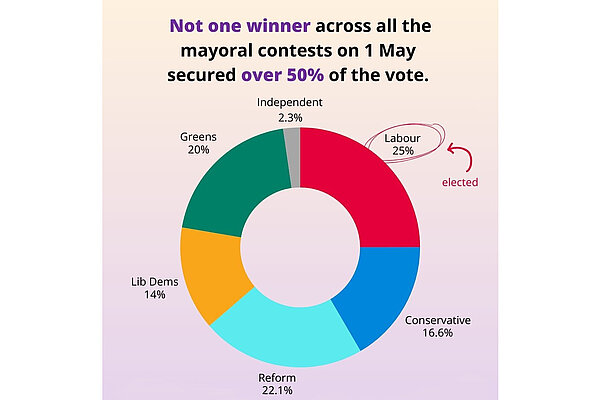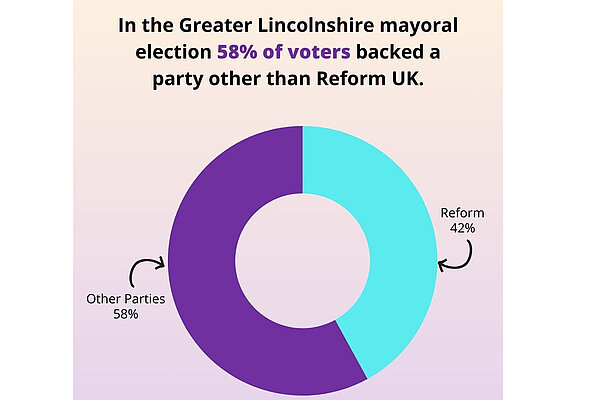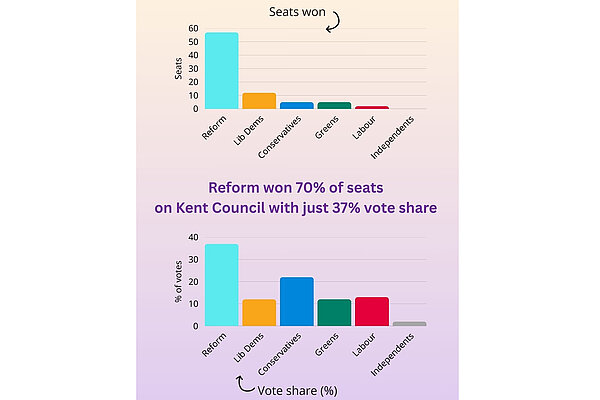First Past the Post has failed English local democracy once again
An opinion piece by Richard Wood, LDER member and campaigner
Earlier this month, voters across much of England went to the polls to vote for local councils and executive mayors. Despite losing out on a mayoralty in Hull and East Yorkshire, our party had a fantastic night. We won the second highest number of councillors (beating Labour and the Conservatives), we took control of three councils, and we got an estimated national vote share of 17%.
Unfortunately, the dominant story of the night was the rise of Reform, but it's important to remember that our voting system has exaggerated their successes and warped the results overall. If there's one good thing about their progress, it's that it shines a spotlight on the mismatch between our restrictive voting system and the multi-party system that is the reality of 21st century British party politics.
As in House of Commons elections, English local councils and mayoralities use First Past the Post to elect councillors. Here's how the system let down voters across much of England.
The mayoral elections expose how First Past the Post fails to truly represent our multi-party politics. Whatever we think of directly elected executive mayors, they are here to stay. Initially introduced with the imperfect but slightly fairer Supplementary Vote system, the Conservatives did away with that and imposed First Past the Post. Now we have mayors with weak mandates attempting to represent communities with diverse political views.
Just look at the results from the six mayoralities up for grabs. Not one winner across all contests secured over 50% of the vote. The worst culprit was in the West of England where five parties received over 10% of the vote including the winning Labour candidate on just 25%. Low turnout aside, 3 in 4 voters voted for someone else.

Even in Greater Lincolnshire where Reform won 42% of the vote, 58% of voters backed a candidate from a different party.

Single-member elected positions will never truly be able to represent everyone fairly by their very nature. But the best option to ensure broad mandates and empower voters in this case is single-member STV where voters rank candidates in order of preference to produce a mayor who accurately represents their constituents. Had we had such a system in place this year, mayors would have broader mandates and voters would overall elect the optimum candidate rather than resorting to tactical voting.
Turning to the councils, it's a testament to the hard work of local campaigns that we took control of Oxfordshire, Cambridgeshire and Shropshire county councils. But as Liberal Democrats we recognise that we did this without winning a majority of votes in each county, including in Shropshire where we won a majority of seats on 34% of the vote, mirroring Labour's win in last year's General Election.
The same goes for all the other councils up for grabs. Reform may have won a majority of seats across 10 councils, but those majorities don't accurately reflect how people voted.
Look at Kent County Council where Reform won 57 of 81 seats on 37% of the vote. That's a colossal majority on a minority of the vote. Kent Liberal Democrats won 12 seats on 12% of the vote yet Conservatives there only received 5 seats on almost double our vote share (22%). Meanwhile local Greens took 5 councillors on 12% of the vote while Labour received 2 seats on 13%, further showing the broken link between seats and votes.

Wherever you look, seats don't match votes thanks to our unfair voting system. Adopting a proportional system (STV) to elect councillors in multi-member wards will strengthen our democracy at the local level. Our 2024 manifesto committed to this, and we only have to look to local elections in Scotland, which, thanks to Scottish Liberal Democrats in government at Holyrood, have successfully used STV to elect councillors since 2007.
This year's votes for both mayors and local councils show a major discrepancy between seats and votes, warping England's democracy once again. The government should recognise that the days of two-party politics are long gone and work with us to create a fair system where how we vote at the ballot box is reflected in our town halls. The Liberal Democrats for Electoral Reform demand better.
